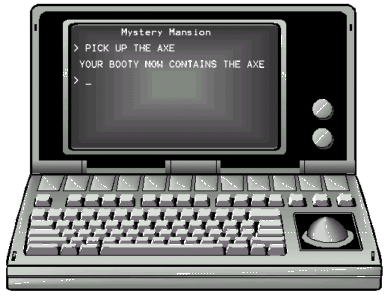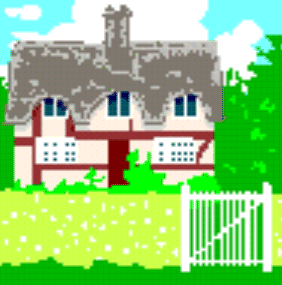Bob's Games
Mystery Mansion
An old-style text-based adventure game!!
[Last Update: 03 August 2018]


The link below points to a zip file which contains an executable file (MMM.EXE) for PC's,
a text file (MMMEXPL.TXT) which contains most of the information on this page, and an icon
(MANSION.ICO) that can be used with the executable for a Windows(c) shortcut to it.
The executable is an early text-based adventure-type game called Mystery Mansion. If you are
looking for something with fancy graphics, sounds, etc., this is NOT it! I liken this game
to listening to a story on the radio instead of seeing it in a movie theater. It is a nice
change of pace at times from the shoot-em-ups and other modern games (at least I think so).
Again, this may not be your cup of tea, but you are welcome to use it (as is -- NO
GUARANTEES!) for your amusement. I have bashed it around the best I can, but as is
usually the case, I am sure there may be some errors I missed.
A little background: This program was originally given to me as Fortran source code by
Hewlett-Packard at one of their schools in the early 1980's. I assume it was written in the
mid-1970's, as the code was *very* unstructured (no IF-THEN-ELSE constructs, for example,
which became standard in Fortran 77, I believe), aka "spaghetti code." The code was about
10,000 lines, and contained more "GO TO" statements than you could shake a stick at. It
was also written in a "segmented" form (like overlays), as it was too large to all fit in
memory at the same time. The platform for which it was written (an HP-1000) was a
minicomputer, and had a maximum memory partition size of 32K 16-bit words. The program
consisted of a main part and 12 segments which overlaid each other as needed (a virtual
memory manager took care of that).
Several years ago (when my department got rid of their HP-1000), I decided I would
undertake a port to Pascal. I ended up having memory problems, and put it aside for a
long time before working on it again in C. After many false starts, I finally had some
free time to work on it, and "completed" it to the best of my ability. As it is, it
pushes the limits of a DOS-based program in many ways, and has to be compiled with
certain options set for the Borland C compiler. The executable is approximately 150k in
size, but there is a lot of global data. I did maintain some of the original program
structure in that what used to be separate segments in the Fortran program are different
functions in C. I'm sure many things could be done to the code to reduce its size, but I
have done enough work on it!
About the game itself: Mystery Mansion is a text-based adventure game which challenges the
player to think logically and to remember things that are learned. The basic premise is
that the player is an inspector or detective trying to solve a murder case, but in the
style of these old games, there is much more to it (like finding valuable items, etc.).
The fun is in trying things to see what works and to see how good a score you can get.
You can save up to nine games, but there is no "hall-of-fame" or "high-score" feature
included. I thought about including that, but as I said, things were already pushing the
limits for a DOS-based program.
If you are a programmer and want the source code, just e-mail me (see my main page), and I
will gladly send it to you. I must give credit to a man named Bill Wolpert at H-P who did
the original program (even though I found a lot of errors in it, and have added several of
my own features along with things that looked like they were supposed to be included in
the original, but were not).
NOTE: "Magic word" bug fixed 27 Apr 2001
[Thx Greg O'Connor!]
To get the Mystery Mansion ZIP file, Click Here!!

